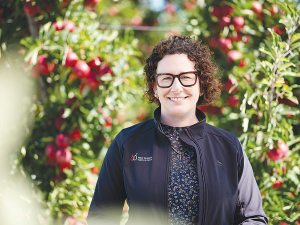Apples and Pears NZ to focus on boosting grower returns
The CEO of Apples and Pears NZ, Karen Morrish, says the strategic focus of her organisation is to improve grower returns.
 Karen Morrish says our growers take pride in producing fruit that is healthy, clean and sustainable.
Karen Morrish says our growers take pride in producing fruit that is healthy, clean and sustainable.
OPINION: Earlier this month, we received the exciting news that New Zealand’s apple and pear sector had surpassed $1 billion in revenue for the very first time.
It is a significant achievement and a true testament to the hard work and resilience of our growers after a number of challenging seasons.
However, scratch at the surface of the data (NZAPI’s 2024 Economic Impact report), and you’ll reveal even more about our valuable and everchanging sector.
While planted area has more or less returned to a pre-Cyclone status quo and operating costs – along with inflation – continue to weigh heavy on growers, revenue has increased significantly, by 27%.
We attribute this movement to an increase in high-value, premium apples and pears, as well as improvements to productivity and a diversification of international markets.
It hasn’t come from flooding the global marketplace with New Zealand pipfruit – certainly Aotearoa is a small producer compared to most on the international stage. Rather it has eventuated by pulling sustainable levers that ensure a healthy operating environment conducive to grower prosperity.
It also comes from doing what we do best, producing the world’s best apples.
New Zealand apples and pears are renowned as a premium product. Our growers take pride in producing fruit that is healthy, clean and sustainable, and this year’s crop is exactly that.
Harvest is underway and the fruit coming off the trees is consistently excellent; clean, high-value, premium-quality fruit.
Textbook winter and spring conditions ensured New Zealand’s apple and pear harvest would have exceptional colour, eating and flavour, while storability is expected to be as good as ever.
What’s more, the 2025 New Zealand Apple and Pear’s annual crop estimate is predicting this season’s harvest to deliver a 10% increase on exports, from 19.1 million TCE in 2024 (actual) to a potential 21.0 million TCE in 2025.
It is a return to form for the industry after several challenge years and will have meaningful flow-on effects to related industries and the communities around us.
Our growers take immense pride in the economic impact that their industry contributes to New Zealand and the economic impact statistics highlight the value of the industry’s work.
As more older orchards are replanted with IP varieties with modern planting systems, the downstream benefits will be significant to the sector, national exports and the towns and cities we live in.
The 2024 Economic Impact data recorded a total economic impact of $2.5 billion to the New Zealand economy, up 27% from $1.9 billion in 2023. The industry now employs more than more than 13,500 people, up from 12,820 in 2023.
At a regional level, the growth trend continues.
In Hawke’s Bay, home to 65% of the nation’s apple and pears crop, the industry contributed $1.3 billion in total economic impact; increased its GDP contribution by 37% to $583 million; and now employs more than 7,000 people.
In Tasman, home to 23% of the national crop, the industry contributed $383 million in total economic impact; increased its GDP contribution by 8% to $179 million; and now employs more than 3,300 people.
In Tairāwhiti, home to 5% of the national crop, the industry contributed $75 million in total economic impact; increased its GDP contribution by 38%, from $25 million in 2023 to $35 million; and employs almost 100 people.
In Central Otago, home to 4% of the national crop, the industry contributed $65 million in total economic impact and increased its GDP contribution by 8% to $30 million.
Yet, as we take a moment to reflect on this achievement, it’s important to note revenue does not equate to orchard gate returns.
Our growers and the wider sector remain committed to growth and excellence, ensuring that New Zealand pipfruit is consistency recognised as the best in the world. However, returns that fund this growth, development and excellence are the critical requirement to ensure the industry remains buoyant.
So, we wait to see what 2025 will bring, and work to secure a legislative and working environment that delivers prosperity, not just to the New Zealand economy but back to our growers themselves.
Karen Morrish is chief executive of New Zealand Apples and Pears Inc.
The third edition of the NZ Dairy Expo, held in mid-February in Matamata, has shown that the KISS principle (keep it simple stupid) was getting a positive response from exhibitors and visitors alike.
Twenty years ago, South African dairy farm manager Louis Vandenberg was sent to a farm in Waikato to provide training on Afimilk technology.
Strong farmgate milk price is helping boost investment on farms, says PGG Wrightson chief executive Stephen Guerin.
Fonterra's 460 milk suppliers in Australia, who will switch to Lactalis end of this month, are unfazed with the impending change.
The 5+ A Day Charitable Trust has launched a collection of affordable recipes designed to turn everyday vegetables into seasonal stars.
Jane Mellsopp has been confirmed as the new Government Appointee to the New Zealand Meat Board (NZMB).

OPINION: A mate of yours truly reckons rural Manawatu families are the latest to suffer under what he calls the…
OPINION: If old Winston Peters thinks building trade relations with new nations, such as India, isn't a necessary investment in…